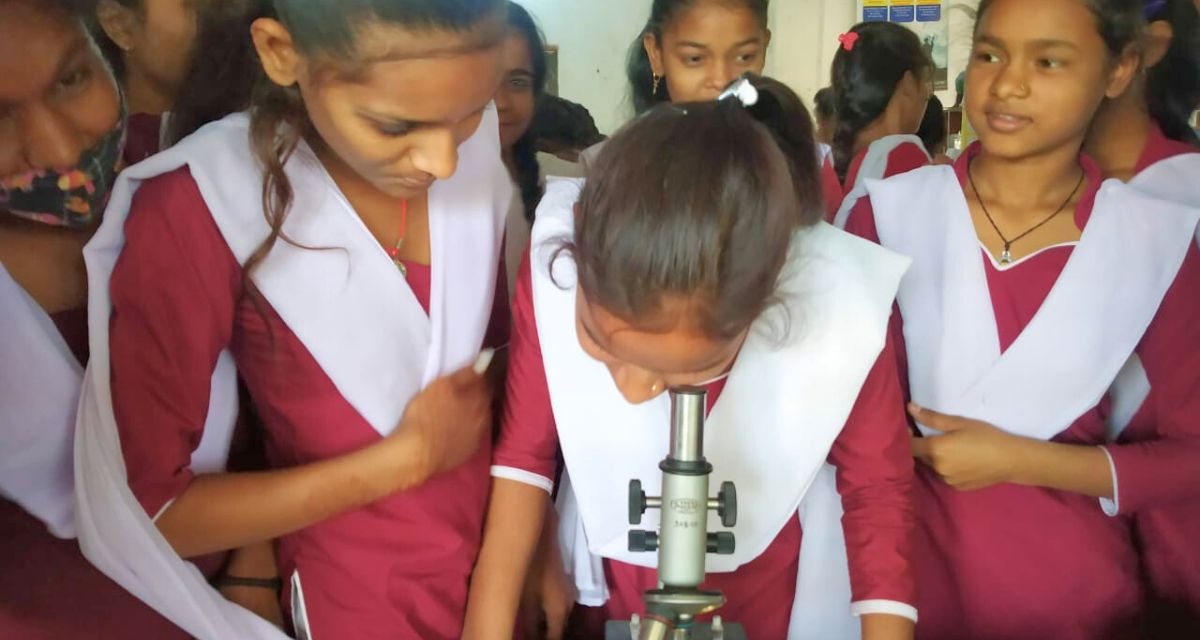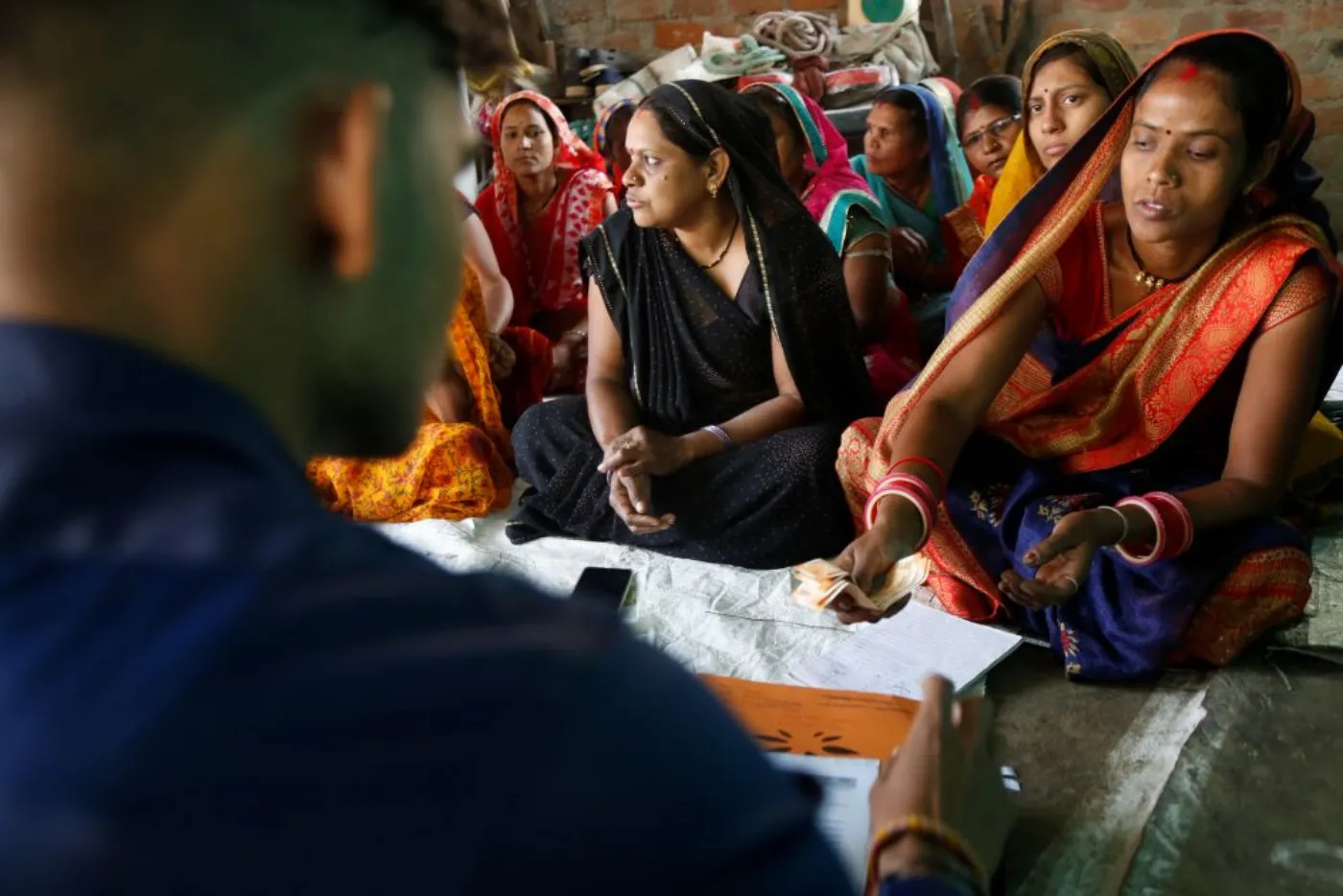By Rachna Priyadarshini
Patna, Bihar: ‘Biology and chemistry practicals are conducted regularly in the science lab of our school, but the study of physics is less. In fact, the subject teacher does not come to the class at all. Even if he ever does, he himself experiments and we children just watch him at work. We never got a chance to do a lab experiment ourselves,’ said Sunidhi Kumari*, a class 10 student at the Government Higher Secondary School (GHSS) in Sarta of Bihar’s Jehanabad district.
Trilok Sharma*, one among the 450 students enrolled in the many divisions of class 10 at Dayanand Boys High School, Mithapur, Patna, also said the teachers did the experiments on their own. There are others like Ashu Kumari* of class 10 of Sarai GHSS, who said, ‘There is a lab in our school, but practicals are not regular. The dilapidated lab room does not have all the necessary equipment.’
In a bid to improve the educational conditions of government schools in Bihar, an agreement was signed between the Indian Institute of Technology (IIT), Patna, and the Bihar Education Project Council on April 28 last year. Under it, IIT Patna would establish model labs of physics and chemistry in 50 government schools in Bihar.
Professor Pritam Kumar, Head of Department, Electrical Engineering, IIT Patna, told 101Reporters that the agreement aimed at modernising science labs in two phases, as per the Bihar School Examination Board syllabus. ‘In the first phase, seven schools in Patna underwent transformation. The subject teachers of these schools were given a week-long training on teaching science in an interesting manner on the IIT campus. Now, this work will start in 43 more schools in the second phase from December onwards,’ he said.
Government Girls HSS, Bankipur, Manju Sinha Project Girls’ High School, Bakhtiyarpur, RSM Railway Aided High School, Mokama Ghat, Shaheed Rajendra Prasad Singh School, Gardanibagh, Devipad Choudhary Memorial Miller HSS, Patna, TK Ghosh Academy, Patna, and Patna Collegiate School have received lab facilities in the first phase.
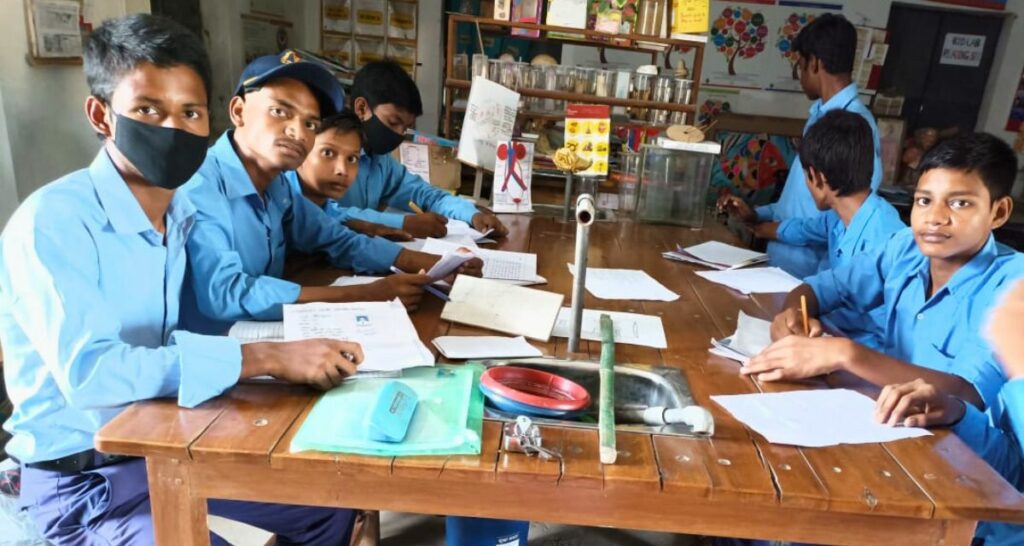
‘Science labs play a key role in developing scientific temper in children and helping them grapple with the technical problems of day-to-day life and find solutions,’ said Chandan Kumar, Director of Port Lab, a startup that provides portable or temporary lab facilities to children in the schools of Patna where science labs are not present.
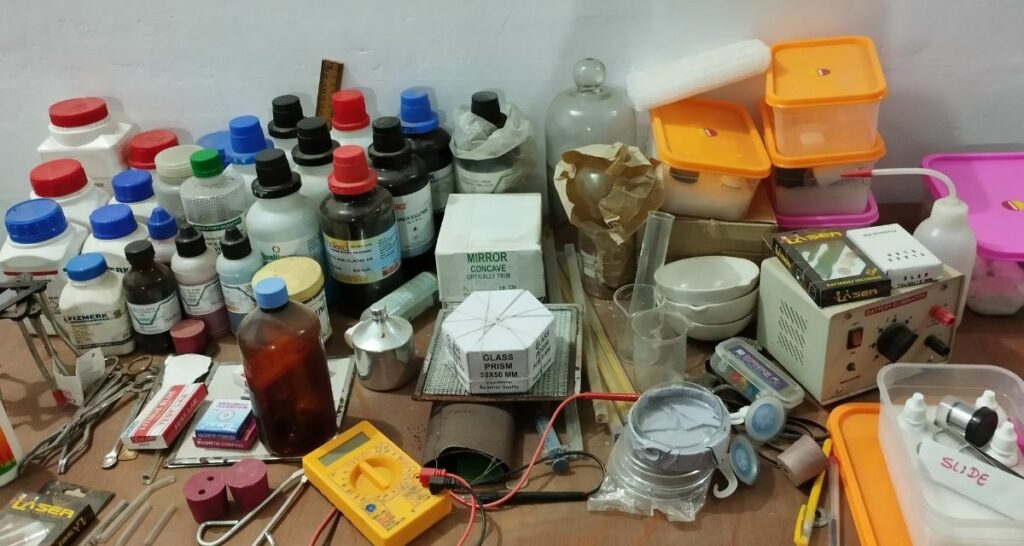
Manoj Kumar, Director of Secondary Education, told 101Reporters that the estimated cost of the project was Rs 7.96 crore. ‘In the first phase, Rs 1.05 crore has been spent. The remaining Rs 6.91 crore will be used in the next phase,’ he said. Notably, over one-and-a-half years have passed since the agreement to modernise labs was signed, but the benefits have not been witnessed far and wide.
Missing teachers
According to a report from the National Council of Educational Research and Training, 6,543 of the total 9,765 child scientists in Bihar last year studied in government schools. There is no dearth of talent, be it in preparing new science projects or innovation.
However, Zaki Imam, a science teacher at UMS Nawada Boys School, Darbhanga, said merely having labs for science subjects was not enough. ‘Teachers should be dedicated to teaching their subjects… In total, we have around 200 students in classes 6, 7 and 8. However, only some necessary tools are at our disposal to make children understand basic science concepts. We have no separate labs either. We teachers make them do experiments in our own ways,’ he said.
Bankipur Government Girls High School Principal Meena Kumar told 101Reporters that the project has not brought much change as the school already had a science lab, which girls were utilising. ‘Yes, some equipment and chemicals have been provided in the physics and chemistry labs,’ she said.
There is no concept of science labs in the middle schools of Bihar. ‘We try to clear the basic concepts by bringing things such as vinegar, paper, bottles, balloons and matchsticks from our homes,’ said Shobha Tiwari, a science teacher at the Government Middle School at Ghirsindi in Aurangabad district.
Narayan Kumar*, a class 10 student at Mahadev High School, Khusrupur, Patna, felt the subject got embedded in his mind when lab work was done. ‘It is said that there are separate labs for all three subjects. But the chemistry lab is not functional for the last three months as the chemistry teacher has been on leave. We use the labs of other subjects.’
For the last one year, Kumari Anamika has been teaching physics, chemistry and biology (PCB) at the Upgraded High School, Kharmauli, Begusarai district. ‘About 1,500 children are enrolled here from class 9 to 12. I am responsible for everyone’s lab classes. Competitions are often organised in our school, in which junior teachers also help. There are many vacant posts of teachers at the high school level. Even children do not come after taking admission. Those who come regularly are mostly from the working class,’ she said.
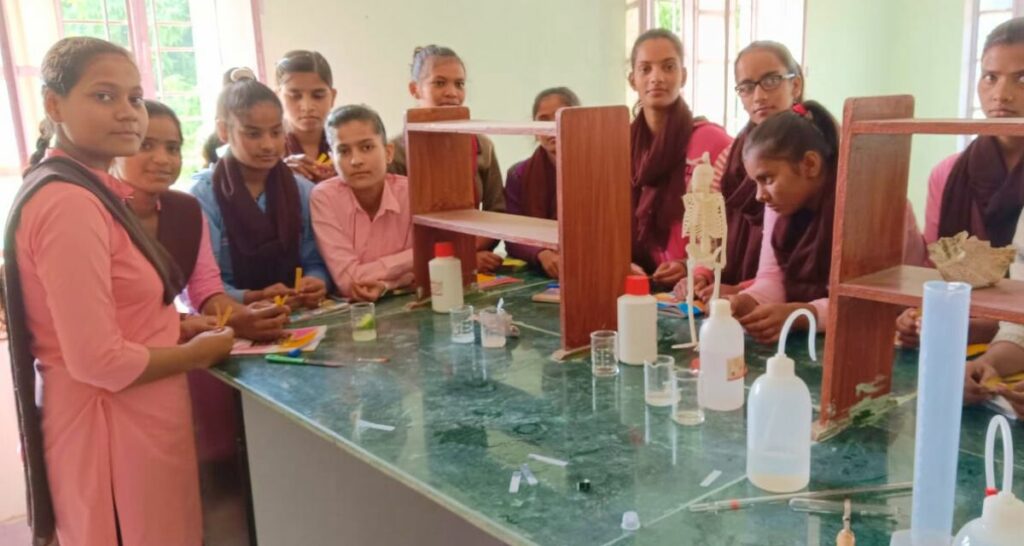
Gopa Kumari has been teaching PCB at the Upgraded High School at Sabour in Bhagalpur for a decade now. ‘About 800 to 900 children study here, but there are no teachers in proportion to the number of children. There is a lab, but not all lab equipment is there. When funds were received from the government a year ago, the school administration purchased lab items. However, due to lack of proper care and maintenance, they were stolen,’ she said.
Lack of resources for science students
‘Our school neither has its own building nor lab facility. There are no separate teachers for mathematics and science. The high school also runs in the same building as the middle school and I teach science subjects to the children at both levels. The school has provided us with science kits. We teachers also collect some materials to aid students. Of all the upgraded high schools in Banka district, about 70 per cent do not have labs,’ claimed mathematics teacher Anil Kumar at the Upgraded High School in Inarvaran village of Banka district.
‘Our lab is a makeshift facility working out of a dilapidated building. The government process is so slow that even after complaining several times, repairs have not been done. Labs of all three subjects operate at one place. I take both practical and theory classes. Till now, we were dependent on traditional laboratory techniques to teach science, but after attending a workshop in Pune, we have learned how to teach children basic science by using things around us,’ said Shashi Prakash Saroj, a teacher at the Upgraded High School at Paiga in Bhojpur district for the last eight years.
In January-February, 65 teachers from across the state participated in a 10-day iRISE training programme organised at the Indian Institute of Science Education and Research, Pune. Its objective was to enrich the scientific outlook of teachers and to familiarise them with the techniques of imparting science education even with limited resources.
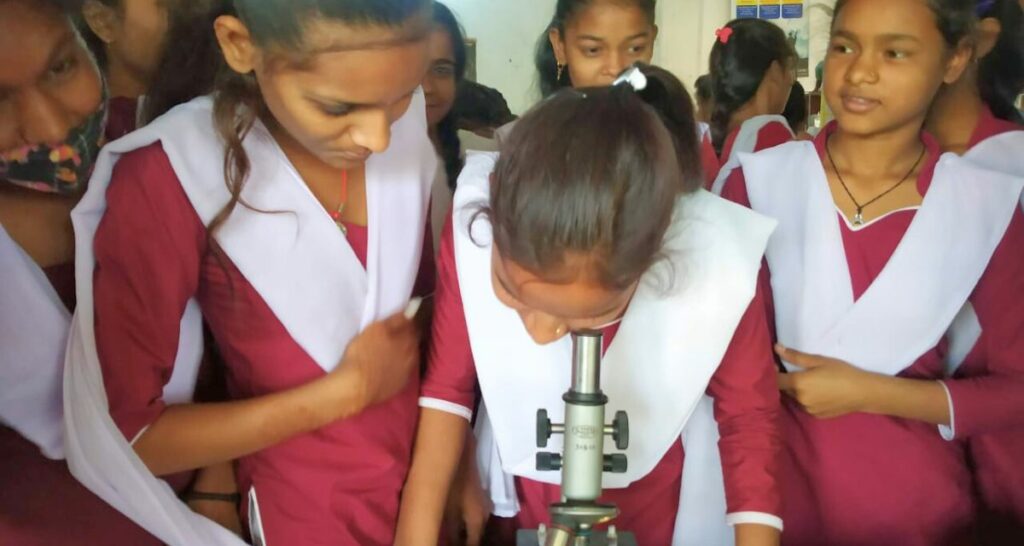
‘We have only one small science lab here, in which practicals of all three subjects are conducted. A new building has been constructed, but the school has not been shifted due to lack of road connectivity. There are no teachers for physics and biology. So, I teach both chemistry and biology, while the mathematics teacher takes physics classes. This is the situation here ever since I joined six years ago,’ said Atulit Singh, a chemistry teacher at Upgraded High School at Mukundera in Buxar district.
Where are the students?
Anjani Pandey, who has been teaching chemistry for a decade at the Higher Secondary School, Misir Batraha, Gopalganj district, said many new equipment were purchased after receiving state government funds about three years ago. ‘Overall, the arrangements here are satisfactory. We have about 2,000 children enrolled in classes 9 to 12, but only on the register. Very few are seen in the classes. This is more or less the condition in the entire Bihar.’
‘Most of the higher secondary students go for coaching in Patna, Delhi and Kota. They are seen only during examinations. During inspections, satisfactory attendance is shown by somehow getting students from here and there. This situation can change only if 75% annual attendance is made mandatory and it is strictly implemented,’ Pandey said.
Biochemistry graduate Anuradha Kumari has been teaching science at SSRS High School, Khagaria, for the last seven years. There are about 450 students in her school. A proper lab facility is also present. However, children do not attend regularly.
S Ambastha, Principal, Upgraded High School, Korra Phulwari Sharif, said there is a science lab, but no lab in-charge and proper facilities. Funds have been received under the Samagra Shiksha Abhiyan, but it is not sufficient. ‘Most of the teachers just provide food in the classroom in the name of studies. Even if some teachers want to teach, resources are not available to them.’
Considering these prevalent issues, it could be safely assumed that there is a need for improvement in science education in Bihar. There is a shortage of teachers, especially for science subjects. The condition in the state capital Patna is somewhat good, but schools in villages and towns are in a deplorable state. In proportion to the number of students in government schools, the posts of about 3,000 teachers are vacant, while the recruitment is only 300.
The basic reason for this is the education policy of the Bihar government, in which the increase in the number of children enrolled in schools has been accepted as the criterion for educational achievement, but the government does not pay any attention to whether they get quality education or not.
Rachna Priyadarshini is a Bihar-based freelance journalist and a member of 101Reporters, a pan-India network of grassroots reporters.
About the author(s)
101Reporters is a pan-India network of grassroots reporters that brings out unheard stories from the hinterland.
